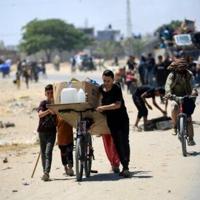Israeli forces carried out strikes on various targets in the Gaza Strip on Friday, with reports of air raids near the southern city of Rafah, which has been a focal point of the ongoing conflict for almost eight months.
Despite international objections regarding the safety of civilians in Rafah, Israel launched a military operation there in early May.
A recent strike in a displacement camp led to a fire and multiple casualties, resulting in widespread condemnation.
Witnesses observed Israeli strikes in the Rafah and Nuseirat areas, with intense bombardment reported in other parts of Gaza as well.
Overnight strikes in two separate locations resulted in the deaths of 11 individuals, according to medical sources in Deir al-Balah hospital and the Nuseirat refugee camp.
The Israeli military confirmed their ongoing operations in Rafah, where they discovered rocket launchers, weapons, and tunnel shafts.
Meanwhile, in central Gaza, additional air strikes targeted and eliminated militants close to Israeli troops.
Israel announced that its forces had taken control of the Philadelphi corridor along the Gaza-Egypt border and had killed around 300 Palestinian militants in Rafah since the start of the military operation.
Thousands of civilians have fled Rafah, carrying their belongings on their shoulders or using various modes of transportation.
– Aid efforts at sea –
Before the offensive in Rafah, the United Nations estimated that up to 1.4 million people were residing in the city, with one million having fled since then, as per UNRWA.
The United Nations has warned of a possible famine in Gaza, exacerbated by the Israeli seizure of the Rafah crossing, which has hindered aid deliveries and closed off the territory’s main exit point.
However, Israel stated that humanitarian aid deliveries had increased, mainly through the Kerem Shalom crossing with Gaza.
Cyprus confirmed that aid shipments to Gaza were being kept at sea due to damage to a pier from bad weather.
In a TV interview, Prime Minister Benjamin Netanyahu rejected allegations of deliberately targeting and starving Gazan civilians, calling it “anti-Semitic slander.”
Netanyahu defended the military’s actions, highlighting a low ratio of militants to civilian casualties in urban warfare situations.
Outside the offices of TF1, protesters gathered to demonstrate against the broadcast of the interview, showing solidarity with Gaza.
The Gaza conflict originated from Hamas’s attack on southern Israel, resulting in a significant number of casualties and hostages taken by militants.
Israel responded with a retaliatory offensive in Gaza, leading to further casualties, including civilians.
Amid ongoing discussions and calls for a ceasefire at the UN Security Council, tensions continue to escalate in the region.
A draft resolution demanding an immediate ceasefire and the release of hostages was presented by Algeria, but its approval timeline remains uncertain.
Political turmoil within Israel has also emerged, with calls for early elections and dissent within the government.
bur-ami/dv





